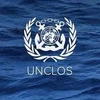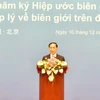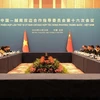Vietnam and Japan have emphasised the necessity of solving disputes and differences by peaceful means to avoid armed conflicts when it comes to sea and island sovereignty issues.
Both have underscored the compliance to international law, notably the UN Convention on the Law of the Sea (UNCLOS) in doing so.
These remarks came out from the second Vietnam-Japan Defence Policy Dialogue in Tokyo on August 9.
Deputy Defence Minister Senior Lieutenant General Nguyen Chi Vinh led a Vietnamese delegation to the event, which is part of activities to mark the 40th anniversary of the two countries’ diplomatic ties.
At the dialogue, an agreement on supporting each other in research capacity building and management for sea areas and actively participating in international forums to build rules and code of conduct applied at sea in conformity with international law was reached.
The two sides reviewed their defence cooperation since the signing of an MOU on defence cooperation and exchange, including the exchange of delegations, personnel training, defence industry, experience sharing in humanitarian aids, search and rescue activities and maritime security.
They talked about cooperation at multilateral forums, including the ASEAN Regional Forum (ARF) and the ASEAN Defence Ministers’ Meeting Plus (ADMM+) to ensure a peaceful, stable region.
Regarding the sharing of experience from peace-keeping missions, Vietnam informed the host of its joining of the UN Peace-keeping force, which was lauded, together with a pledge of first-phase technical and management assistance, by the Japanese side.
Turning to defence industry, the two sides agreed to study, develop and apply science and technology in this field.
The humanitarian issue and war aftermath overcoming was raised during the dialogue.
The Japanese side said it backs Vietnam’s “humanitarian mine action” initiative which will be tabled at the upcoming ADMM+ in Brunei, while the Vietnamese side informed that it is studying the application of Japanese technologies in dealing with Agent Orange/dioxin consequences.
The dialogue also touched upon such issues as non-traditional security, nuclear, mass destruction weapon nonproliferation, marine security and anti-piracy.
Talking to the Tokyo-based Vietnam News Agency correspondent, Deputy Minister Vinh said Vietnamese and Japan defence representatives agreed that in the coming time, the Asia-Pacific will have more opportunities for further development.
However, “it can only grow when it is peaceful and stable,” he said
Host and guest also pointed out that the absence of each nation’s efforts as well as multilateral cooperation will seriously affect development potentials of the region.
Earlier on August 8, Deputy Defence Minister Vinh paid a cordial visit to Japanese Defence Minister Itsunori Onodera, during which he delivered the country’s wish to intensify the full, comprehensive, trustful, effective and mutually-beneficiary defence cooperation with Japan for peace, stability and development in the region.
He visited some units of the Japan defence force and Sojizt group, which has developed a technology to treat Agent Orange/dioxin.-VNA
Both have underscored the compliance to international law, notably the UN Convention on the Law of the Sea (UNCLOS) in doing so.
These remarks came out from the second Vietnam-Japan Defence Policy Dialogue in Tokyo on August 9.
Deputy Defence Minister Senior Lieutenant General Nguyen Chi Vinh led a Vietnamese delegation to the event, which is part of activities to mark the 40th anniversary of the two countries’ diplomatic ties.
At the dialogue, an agreement on supporting each other in research capacity building and management for sea areas and actively participating in international forums to build rules and code of conduct applied at sea in conformity with international law was reached.
The two sides reviewed their defence cooperation since the signing of an MOU on defence cooperation and exchange, including the exchange of delegations, personnel training, defence industry, experience sharing in humanitarian aids, search and rescue activities and maritime security.
They talked about cooperation at multilateral forums, including the ASEAN Regional Forum (ARF) and the ASEAN Defence Ministers’ Meeting Plus (ADMM+) to ensure a peaceful, stable region.
Regarding the sharing of experience from peace-keeping missions, Vietnam informed the host of its joining of the UN Peace-keeping force, which was lauded, together with a pledge of first-phase technical and management assistance, by the Japanese side.
Turning to defence industry, the two sides agreed to study, develop and apply science and technology in this field.
The humanitarian issue and war aftermath overcoming was raised during the dialogue.
The Japanese side said it backs Vietnam’s “humanitarian mine action” initiative which will be tabled at the upcoming ADMM+ in Brunei, while the Vietnamese side informed that it is studying the application of Japanese technologies in dealing with Agent Orange/dioxin consequences.
The dialogue also touched upon such issues as non-traditional security, nuclear, mass destruction weapon nonproliferation, marine security and anti-piracy.
Talking to the Tokyo-based Vietnam News Agency correspondent, Deputy Minister Vinh said Vietnamese and Japan defence representatives agreed that in the coming time, the Asia-Pacific will have more opportunities for further development.
However, “it can only grow when it is peaceful and stable,” he said
Host and guest also pointed out that the absence of each nation’s efforts as well as multilateral cooperation will seriously affect development potentials of the region.
Earlier on August 8, Deputy Defence Minister Vinh paid a cordial visit to Japanese Defence Minister Itsunori Onodera, during which he delivered the country’s wish to intensify the full, comprehensive, trustful, effective and mutually-beneficiary defence cooperation with Japan for peace, stability and development in the region.
He visited some units of the Japan defence force and Sojizt group, which has developed a technology to treat Agent Orange/dioxin.-VNA



















